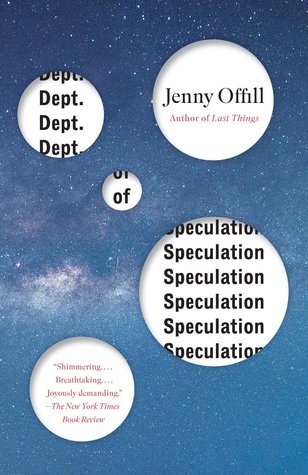In “Dept. of Speculation,” Jenny Offill crafts a lyrical exploration of love, marriage, and the intricate tapestry of human relationships. Through a fragmented narrative that mirrors the complexities of life itself, Offill invites readers into the mind of an unnamed protagonist whose reflections oscillate between the ordinary and the profound. The novel, with its sharp observations and poignant insights, delves into the interstitial spaces of existence—a world where grand declarations of love coexist with the mundane realities of day-to-day life. In this review, we will unravel the delicate nuances that Offill masterfully weaves throughout her work, examining how her unconventional storytelling illuminates the beauty and fragility that define our most intimate connections.
Delving into the Fragile Interplay of Love and Life in Dept. of Speculation

In Jenny Offill’s remarkable narrative, the delicate threads that weave love and life together manifest with both beauty and sadness. The protagonist navigates the complexities of her marriage, motherhood, and existential musings, revealing that love is not always a straight path. Moments of joy and doubt coalesce, portraying the reality that relationships are often a mosaic of experiences—each piece adding texture and depth. This fragmented style encapsulates the ephemeral nature of human connection, uncovering how love transforms amid the chaos of daily life.
The exploration of desire and disillusionment further enriches the narrative—a testament to how intertwined life and love truly are. Through an array of poignant observations, Offill delves into the profound intricacies that define long-term partnerships. Key themes emerge as whispers of wisdom and reflections of vulnerability:
Best-Selling Books in This Category
- Intimacy: The closeness shared can together breed comfort and fear.
- Interaction: The silences carry as much weight as spoken words.
- Change: Love evolves, sometimes leaving a trail of longing in its wake.
- Resilience: The struggle to stay connected amidst life’s unpredictable turns.
A brief examination of the transformative moments within relationships reveals a stark truth: love, like life, is an intricate dance between the mundane and the unusual, homing in on the shared human experience. This interplay exposes characters to profound realizations about themselves and each other, reinforcing that understanding and empathy are paramount in sustaining a lasting bond.
| Theme | Example from the Book |
|---|---|
| Intimacy | The shared moments of silence that echo with unspoken truths. |
| Communication | difficult conversations that reveal the fragility of connection. |
| Change | The evolving dynamics as characters face life’s challenges. |
| Resilience | Moments of understanding that foster growth amidst turmoil. |
The Art of Minimalism: How Offill’s Economy of Words Amplifies Emotion

Jenny Offill’s narrative style in “Dept. of Speculation” is a testament to the transformative power of brevity. Each sentence she crafts serves as a delicate brushstroke on the canvas of love and life. Through her economy of words, she captures the complexities of human relationships and emotions, allowing readers to fill the gaps with their interpretations and feelings. This unique storytelling approach invites readers into a world where silence often speaks louder than words, emphasizing the raw intensity of disconnection and longing. As the protagonist navigates the tumultuous waters of marriage and self-identity, we see how succinct observations become charged with emotional depth.
The art of minimalism in Offill’s work not only reflects her individual characters but also paints a broader picture of the human experience.By including brief, poignant snippets of thought, she manages to convey a wealth of worldwide themes, such as:
- Isolation: Moments of solitude that resonate deeply within the shared human condition.
- Love’s Fragility: The delicate balance between intimacy and distance, captured in the smallest gestures.
- Existential Questions: Brief reflections on the meaning of life and the passage of time that linger long after reading.
Through this stripped-down approach, Offill offers readers an emotional landscape that is rich yet sparse, allowing for profound introspection and connection. Her style invites us to appreciate the beauty in simplicity and the power of what is left unsaid, crafting a narrative that speaks volumes through its understated elegance.
Navigating the Complexity of Relationships Through Fragmented Narratives

Jenny Offill’s Dept. of Speculation masterfully employs fragmented narratives to explore the complexities inherent in human relationships. The disjointed structure mirrors the chaotic and unpredictable nature of love, where moments of clarity intermingle with confusion and despair. This technique allows readers to engage with the characters’ emotional landscapes more intimately, drawing them into a world that reflects the messiness of life. A series of vignettes—each a small, polished gem—provides insights into the lives of the protagonist and her partner, encapsulating the essence of their connection as well as their individual struggles. The narrative arcs, though nonlinear, weave together themes of intimacy, vulnerability, and the existential dilemmas that haunt modern love.
In this intricate tapestry, Offill deftly highlights how the mundane and the profound coexist, often within the span of a single sentence.Readers encounter the protagonist’s inner voice, punctuated by thoughts that reveal:
- The weight of silence during emotional chasms.
- The fleeting joy found in simple, shared experiences.
- Subtle betrayals of both self and others.
Moreover, the use of fragmented thought patterns reflects the struggles of communication—how far apart two people can feel even while sitting side by side. This representation of fragmented narratives challenges the reader to piece together the larger story of love—a kaleidoscope of raw moments that encapsulate both beauty and pain in the ongoing journey of partnership.
Moments of Clarity: The Role of Everyday life in understanding Love

In Dept. of Speculation, Jenny Offill crafts a tapestry of everyday life that reveals the profound nature of love through its nuances and complexities. The protagonist navigates moments that are at once trivial and monumental, illustrating how the mundane can offer insights into the depths of human relationships. Through quiet observations and seemingly insignificant events—like sharing a cup of coffee or a walk in the park—readers uncover a deeper understanding of love’s resilience. this exploration helps contextualize experiences that often elude direct expression, compelling us to look beyond the grand gestures and find meaning in the rhythm of daily existence.
The text highlights several moments that encapsulate the essence of love, ranging from fleeting smiles to shared silence. These instances paint a picture of intimacy that resonates with anyone who has grappled with the complexities of affection. Consider the following elements that emerge from the prose:
- Communal Rituals: The meaning of everyday habits, such as cooking together or watching a favorite show.
- Silent Companionship: The comfort found in simple presence, emphasizing that love often thrives in quietude.
- Moments of Disconnection: The reality that misunderstandings and distance are integral to love’s narrative.
These moments intertwine to form a rich understanding of the protagonist’s longing and commitment, illustrating how love adapts and evolves amidst the ordinary chaos of life. It is within these fleeting instances that clarity emerges, offering profound revelations that challenge the binary views of love as solely joyful or painful.
The Symbolism of Space and Distance in Marriage and Nonconformity

In Jenny Offill’s Dept. of Speculation, space and distance serve as potent metaphors for both the intimate and alienating dimensions of marriage. The characters navigate the emotional landscapes of their relationship, frequently enough finding solace in solitude yet yearning for connection. This duality offers a rich commentary on how physical and emotional separations impact the bonds we form. Members of the same family can experience a profound disconnection, highlighting how the cacophony of daily life can drown out genuine dialog and understanding. As they drift closer to the brink of nonconformity, the characters embrace their individuality, questioning societal expectations and, in doing so, they redefine what love looks like in the context of modern existence.
The interplay of distance not only serves to challenge the customary constructs of marriage but also reflects the internal struggles of individuals seeking authentic expressions of self within the confines of partnership. Through fragmented narratives and brief vignettes, Offill illustrates how separation can forge both isolation and insight. The characters frequently enough reflect on their choices, leading to moments of clarity amid confusion. The following table encapsulates the recurring themes of space and distance as they appear in the novel:
| Theme | Description |
|---|---|
| isolation | Characters experience emotional withdrawal despite physical proximity. |
| Clarity | Moments of solitude lead to deeper self-understanding and revelation. |
| Yearning | A constant desire for connection amidst barriers of communication. |
| Nonconformity | Exploration of individual identity against societal expectations. |
Reflections on Parenthood: Dissecting the Tangible and Intangible Bonds

Jenny Offill’s exploration of parenthood in “Dept. of Speculation” reveals the complex interplay between affection and the underlying fears that shape a parent’s experience. The protagonist grapples with the weight of her maternal instincts, where love transcends mere emotion, intertwining with the anxiety of impermanence. Through poignant vignettes, we witness her internal dialogue wrestle with the dichotomy of security and uncertainty. In this landscape, the bonds formed with her child are both tangible—manifesting in everyday rituals and protective instincts—and intangible, rooted deep within the existential dread of what the future holds. Offill masterfully balances the mundane with the profound, shedding light on the unspoken truths of love: it is as stunning as it is terrifying.
As we navigate these turbulent waters, the novel compels readers to consider the invisible threads that hold family units together. The protagonist’s reflections on maternal love reveal layers of attachment that are frequently enough left unexamined. These insights prompt us to ponder the following aspects of parenthood:
- Vulnerability: The realization that love can lead to profound hurt
- Connection: The moments of shared joy that create lasting bonds
- Change: The understanding that children grow and relationships evolve
The conversations and small moments captured throughout the narrative provide a framework for examining these themes. A table illustrating these facets of parenthood underscores their distinct yet intertwined nature.
| Aspect | Description |
|---|---|
| Vulnerability | The fear of loss and the weight of responsibility |
| Connection | Intimate moments that foster closeness and understanding |
| Change | The evolving nature of relationships over time |
The Power of Memory: How Past Influences Shape Present Love Stories

In Jenny Offill’s Dept. of Speculation, memory plays a pivotal role in shaping the characters’ relationships and their understanding of love. The protagonist, through a series of fragmented thoughts and reflections, navigates the complexities of her marriage, intertwining past experiences with her present reality. This narrative technique emphasizes that memories are not just echoes of the past but are active forces influencing decisions, emotions, and perceptions. Moments of joy and sorrow from prior relationships, familial ties, and even casual encounters contribute to how love is perceived and what expectations are formed. Readers glimpse how memories can serve as both anchors and weights, pulling the characters in various directions, and revealing the intricate pattern of their emotional landscapes.
Moreover, the impact of memory extends beyond individual experiences, echoing themes of universality and shared human experience. Offill artfully captures this through snippets of wisdom and scattered observations, highlighting how the past can frame collective memories. The novel suggests that love is not merely about the present interactions between partners but a tapestry woven from:
- Childhood experiences and attachment styles
- Previous relationships and unresolved feelings
- Cultural narratives and societal expectations
By examining these threads, readers are left with an understanding that love is a complex, layered phenomenon deeply enriched by the footprints left by memory. Knowledge of this intricate interplay adds depth to the characters’ journeys and evokes a sense of empathy from the audience,reminding us that our own love stories have been shaped by the memories we carry.
Life’s Uncertainties: Embracing Ambivalence and Intrigue in Offill’s Work

In Jenny Offill’s ”Dept. of Speculation,” the interplay of uncertainty and doubt acts as a backdrop that shapes the narrative’s exploration of love and life.Through fragmented prose, Offill immerses readers in a world where the questions frequently enough outweigh the answers. This tension is palpable as the protagonist navigates the complexities of her relationships, especially marriage. The ambivalence reflects the reality of human connection—how love can simultaneously ignite joy and fear, binding and liberating the individuals involved. The use of rapid-fire observations invites a contemplative response, allowing readers to dwell in the intricate, often contradictory emotions that accompany devotion.
The author skillfully weaves in moments of brilliance, revealing those fleeting instances of clarity amid chaos. These moments serve as a reminder of the beauty found within the unpredictable journey of life. As an example, consider these poignant reflections:
- The fleeting nature of happiness: Joy is painted as a temporary state, one that could dissolve at any moment.
- The burdens of commitment: Love is not just bliss; it comes with expectations and disappointments.
- Unanswered questions: Offill leaves the reader with lingering uncertainties, echoing the unresolved aspects of existence.
Through her unique lens, Offill transforms ambivalence into an essential theme, prompting us to embrace life’s unpredictable rhythm. This dance between hope and despair reveals that while we may seek certainty, it is often the very tension of not knowing that enriches our experiences and deepens our understanding of what it means to love and be loved.
Connecting with Readers: The Universality of Offill’s Themes of Loneliness

The profound sense of isolation that permeates Jenny Offill’s narrative in Dept. of Speculation resonates deeply with readers, striking a chord that feels both intimate and universally shared. The themes of loneliness manifest not only in the experiences of the protagonist but also echo the silent struggles that many endure in their everyday lives. Offill creates a landscape where existential musings intertwine with the mundane, leading readers to grapple with the void that frequently enough hides beneath the surface of daily interactions. This subtle yet powerful exploration highlights how feelings of disconnection can arise even amidst crowded spaces, making it a relatable reflection for many.
Offill’s ability to articulate the intricacies of loneliness shines through her distinctive prose, inviting readers to confront their own vulnerabilities. By skillfully employing a fragmented narrative style, she captures the fleeting nature of human connection and the pervasive sense of longing for understanding and companionship. Key elements that contribute to this theme include:
- Fragmentation of Thought: Reflects the chaotic nature of the human psyche.
- Everyday Interactions: Unveil the hidden complexities of relationships.
- Self-Reflection: Encourages readers to explore their inner lives.
This approach not only deepens the reader’s connection to the text but also fosters an intimate dialogue about the shared experience of being alone in a crowded world, framing loneliness as a common thread that links us all.
Crafting an Intricate Tapestry: The Role of Intertextuality in the Novel

In Jenny Offill’s “Dept. of Speculation,” intertextuality emerges as a vital thread weaving together the fabric of the narrative, allowing the exploration of love and life to resonate on multiple levels. The novel frequently references a myriad of influences, including literary giants and philosophical musings. By doing so, Offill not only enriches her character’s introspections but also offers the reader a profound sense of connection to the broader human experience. This interplay of texts invites us to consider how the echoes of other works—like the whisper of a well-read poem or the gravity of a philosophical treatise—illuminate the intimate struggles of the protagonists. Here, we find characters grappling with the complexities of marriage, motherhood, and existential contemplation, all framed within a literary context that challenges our understanding of personal relationships and the shared narrative of human existence.
Moreover, intertextual references in “Dept. of Speculation” act as a mirror, reflecting the characters’ inner turmoil and revealing the universal themes that bind them together. By incorporating elements from a variety of texts,Offill encourages the reader to engage in an active dialogue with the text,prompting us to draw connections between the characters’ lives and larger philosophical questions. The novel hints at the following:
| Theme | Intertextual Reference |
|---|---|
| Love’s Fragility | Rilke’s poetry on romantic uncertainty |
| Existential Questions | Kierkegaard’s thoughts on choice and commitment |
| The Nature of Time | Vonnegut’s nonlinear storytelling |
Through these layered references, Offill constructs a nuanced exploration of how personal narratives intertwine with a wider literary tradition, pushing us to ponder the nature of our own experiences. In this way, intertextuality serves not only as a tool for enrichment but also as a reminder that each individual narrative—while unique—is a part of a much larger, interconnected story shaped by history, culture, and shared human emotions.
Finding Resilience: The Quiet Strength Found Within Life’s Challenges

In Dept. of Speculation, Jenny Offill intricately weaves the theme of resilience throughout the fabric of domestic life and the complexities of love. The protagonist’s journey reveals how the quiet strength frequently enough emerges from moments of upheaval and vulnerability. As she navigates the challenges of marriage, motherhood, and existential fear, we see that resilience is not about unyielding strength but rather an adaptive, often imperceptible force that helps us find our way through life’s tumultuous waters. Through poignant reflections,Offill illustrates how small,everyday encounters—be it a hushed conversation at midnight or a fleeting moment of connection—serve as reminders of our inherent capacity to endure and evolve.
Key themes of Resilience in Offill’s Work:
- Emotional Depth: The protagonist confronts the complexities of her feelings, allowing for a rich exploration of emotional resilience.
- Moments of Stillness: offill emphasizes that resilience can be found in the quiet moments of introspection, where clarity often surfaces.
- Interpersonal Connections: Relationships provide both challenges and support, highlighting how love can be a source of strength during difficult times.
| Challenge Faced | Resilience Found |
|---|---|
| Marital Strain | Deepened Understanding |
| Parental Responsibilities | Growth Through Patience |
| Identity Crisis | Self-Reflection and Acceptance |
The Poetic Nature of Offill’s Prose: A Glimpse into Her Writing Style

Jenny Offill’s prose in “dept. of Speculation” dances between stark reality and poetic lyricism, creating a tapestry where love and life’s complexities intertwine. Her use of fragmented sentences and abrupt transitions mirrors the chaotic nature of human emotion, capturing fleeting moments with precision. The micro-episodes narrated throughout the novel unfurl a deeper exploration of familial ties,romantic dilemmas,and existential musings. Each chapter serves as a vignette, blending humor and pain, offering readers a glimpse into the intimate spectrums of relationships, where the mundane becomes extraordinary.
Offill’s distinctive craftsmanship can be observed in her rhythmic flow and the juxtaposition of profound thoughts with everyday occurrences. Her writing style transforms ordinary observations into poignant reflections, as shown in her ability to encapsulate the essence of love through spare, yet impactful language. The following table illustrates some recurring motifs in her narrative:
| Theme | Illustrative elements |
|---|---|
| isolation | Moments of silence amidst chaos |
| Connection | Shared glances and small gestures |
| Time | Fluidity of past and present |
Through such devices, Offill invites readers to ponder the subtleties of existence, evoking a contemplative dialogue that lingers long after the final page is turned. Her prose, rich with evocative imagery and sharp insights, makes the exploration of love and life not just a storyline, but an experience to be absorbed and cherished.
Jenny Offill’s Unique Voice: A Confluence of Wit, Wisdom, and Whimsy

In “Dept. of Speculation,” Jenny Offill masterfully intertwines humor and poignancy to explore the complexities of human relationships. Her narrative showcases a unique intermingling of thoughtful reflection and playful language, creating a voice that resonates deeply with readers. The protagonist’s observations about love, marriage, and parenthood unfold through a series of fragmented thoughts that feel both intimate and universal. offill captures the tension between the mundane and the extraordinary, offering a keenly observed tapestry of life that invites readers to reflect on their own experiences. Key elements of her prose include:
- Witty anecdotes that provoke laughter amidst contemplation
- Pithy insights that reveal profound truths hidden in everyday moments
- Whimsical metaphors that elevate the narrative beyond the typical bounds of realism
Offill’s voice is characterized by a remarkable ability to juxtapose moments of levity with the weight of existential inquiry.Through her use of conversational style and fragmented structure, she compels readers to engage with the text on a visceral level. The infusion of playful yet insightful commentary, paired with tender depictions of vulnerability, delivers a thought-provoking exploration of love’s intricate layers. This duality can be summarised in the table below:
| Theme | Expression |
|---|---|
| Love | Captured in the everyday absurdities of relationships |
| wisdom | gleaned from the narrative’s quiet, reflective moments |
| Whimsy | Expressed in the author’s playful language and metaphors |
to Conclude
In closing, Jenny Offill’s “Dept. of Speculation” serves as a poignant reminder of the intricate tapestry that love and life weave together. Through her fragmented yet beautifully lyrical prose, Offill invites us to peer into the depths of a marriage, exploring both the mundane and the profound.The way she deftly balances humor with sorrow makes her exploration of human connection both relatable and deeply stirring. As we turn the final page, we are left not with answers, but with a compelling sense of inquiry—about relationships, solitude, and the spaces in between. This novel is a quiet introspection that resonates long after the last word is read, urging us to appreciate the complexities of our own lives and loves. In a world rife with certainties, Offill’s work reminds us that sometimes, it is indeed the uncertainties that hold the most beauty.














